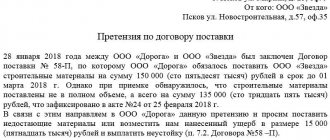Important: the supplier is not responsible for payments to the consumer
The seller or manufacturer is responsible to the consumer for low-quality goods. Typically, the buyer goes to the store where he bought the product and makes a claim there.
The seller is obliged not only to return the money, but in some cases to compensate for moral damages, pay increased penalties for late return of money, and issue another product during the repair. When it comes to court, the seller is fined for refusing to voluntarily satisfy the buyer's demands.
It may happen that the store pays the consumer much more than the price of the product. And the supplier is not obliged to reimburse the seller for payments to the consumer. The seller is independently responsible for the retail sale of purchased goods under the Consumer Rights Law. This is stated in the Resolution of the Supreme Arbitration Court of the Russian Federation dated June 22, 1999 No. 612/99.
The supplier is responsible only for the delivery of defective goods to the store in accordance with the rules of Chapter 30 of the Civil Code of the Russian Federation Purchase and sale and the terms of the supply agreement.
We described in detail how to correctly accept a low-quality product from a consumer so as not to lose money in our article, check it out.
Deadlines for filing claims for hidden product defects
It is possible to file a claim legally within the two-week period established by Article 18 of Law of the Russian Federation No. 2300-I, or before the end of the warranty period.
Technically complex devices may contain parts that are also covered by warranty. In practice, it can be even longer than the warranty period for the entire thing.
In this case, the buyer has the opportunity to contact the store with a claim during the longest warranty period. For example, if you purchased a laptop, the warranty for which is 2 years, and for its individual components - 2.5 years, you can contact the seller within 2.5 years.
Is there no warranty period included in the documents? The legislation of the Russian Federation protects the interests of buyers, therefore, in such a situation, it allows claims to be made to the seller within two years from the date of purchase.
What deficiencies are the supplier responsible for?
A defect of a product is its non-compliance with the purposes of use or with a mandatory requirement such as GOSTs and technical regulations - Art. 469 of the Civil Code of the Russian Federation. The mobile phone randomly turns off - it is inconvenient for the user to make calls. The varnish coating on the interior doors was cracked - a violation of production technology.
A significant drawback is when the product cannot be repaired, or it can, but it is expensive and time consuming. The mobile phone randomly turns off even after two repairs - a significant drawback.
The supplier is responsible only for defects that appeared before delivery to the store and which cannot be seen during inspection of the goods - Art. 476 of the Civil Code of the Russian Federation. This is a manufacturing defect or damage due to improper storage, packaging, or transportation.
If the defect can be seen upon acceptance of the goods from the supplier, but the buyer did not ask for them to be included in the act and eliminated, the supplier is relieved of responsibility - Art. 483 Civil Code of the Russian Federation.
Procedure for filing a claim
As soon as the buyer has identified irregularities in the delivery, he needs to act according to the following scheme:
- call the supplier and warn him about sending a claim (sometimes this measure of influence is enough);
- draw up the claim itself in two copies;
- the manager or other authorized person (acting or deputy) must sign both copies;
- collect evidence of defects , defects and other violations;
- register a claim in the outgoing correspondence journal;
- send a letter to the supplier.
The documents required to formulate a claim are:
- Delivery contract;
- photographs or video materials recording violations;
- affidavits of witnesses.
There is no need to add anything else.
What can you show to the supplier?
Replace the product with a new one
The supplier is obliged to replace the defective product with a new one if the consumer returns the product to the store - Art. 518 Civil Code of the Russian Federation.
Other requirements
If the supplier does not replace the goods on time under the supply contract or within a reasonable time, the buyer makes demands from Art. 475 Civil Code of the Russian Federation:
- make a discount on the product.
- repair the product.
- pay for repairs.
- return payment when a significant flaw is found.
Losses
The supplier pays the buyer for losses that arose due to the delivery of defective goods - Art. 393 Civil Code of the Russian Federation. The buyer's losses are the fee for the examination to determine the defect, the difference between the purchase and retail prices, and the like, except for payments to the consumer.
Example: the court ordered the supplier to replace phones and compensate for losses
The store purchased a batch of mobile phones from a supplier and sold them at retail. Consumers began to return the phones, and the store paid the money. The buyer ordered an examination, and it turned out that the entire batch had a manufacturing defect. Representatives of the supplier were invited to the examination, but they did not come.
The buyer sent a letter to the supplier with a request to replace the defective phones. The supplier did not respond. The buyer took the expert's opinion, checks for refunds to buyers and went to court. The court ordered the batch to be replaced with new, similar models and reimbursement of legal costs in the amount of 352,000 rubles and examination costs in the amount of 52,000 rubles.
Case No. A40-49223/2011.
Example: the court ordered the supplier to return the money and compensate for losses
An entrepreneur purchased a set of doors from another entrepreneur and resold it to the end consumer for an advance payment. The consumer did not accept the goods because the varnish coating on the doors was cracked and the veneer peeled off from the trim. The store ordered a merchandising examination, which established that the doors and trims were manufactured in violation of technology. The store returned the money to the consumer and demanded from the supplier the 35,000 rubles paid to him. The supplier refused. The buyer went to court and won 35,000 rubles and damages for the examination in the amount of 6,000 rubles.
Case No. A11-12121/2017
Options for submitting a claim
Currently, there are several ways to forward correspondence to a counterparty:
- By registered mail with notification . The recipient's response period begins from the date of delivery of the letter.
- By express (courier) . It is necessary to obtain a signature from the supplier's representative that the letter has actually been delivered. The report begins from the date of actual delivery of the letter.
- Through electronic communication channels . This works if both parties have a digital signature, and electronic document management is provided for in the contract.
In any case, you must ensure that the claim is received and accepted by the supplier for consideration. This can be done, for example, by simply calling the counterparty.
How to confirm deficiencies
There are no legal requirements for evidence to confirm defects in the goods upon delivery.
Typically, buyers use an expert's opinion - this is a reliable document. If the examination was not carried out for the consumer, it is ordered for a claim to the supplier. The expert is asked two questions: what is the defect in the product and why did it arise? The supplier is invited to the examination.
If the product has a warranty, the supplier is obliged to prove that the defects appeared due to improper use - Art. 476 of the Civil Code of the Russian Federation.
Who can file a claim
In fact, any employee of the organization can start filing a claim. But most often this is carried out by employees of the legal or economic department who have the skills to compile official documentation and are aware of the latest changes in legislation.
It is necessary that the claim be signed by the head of the company, then it will be considered an official document.
If the buyer is an individual entrepreneur, then most often he himself makes the claim.
How to submit a complaint to a supplier
Read your delivery agreement. Perhaps one of the sections contains instructions for the buyer to send a claim (complaint) to the supplier when the product is returned by the end consumer. If there is one, follow it.
The general algorithm is:
- File a claim. Write down under which contract you purchased the product with the number and date, how you returned the product, and what flaw you found.
- Specify the requirement for replacement of the goods and compensation for losses within a reasonable period of time.
- Write contact details: phone number of the store manager or director.
- Attach copies of evidence: expert opinion, consumer application for return, money back check, check for payment of the examination.
- Send the claim to the supplier by registered mail with notification to the legal address or the address for claims from the contract.
The article is current as of 02/05/2021
Grounds for filing a complaint
In order for the buyer to file a claim with the supplier, a violation of any of the clauses of the contract is sufficient. Most often this is a missed deadline or a complete refusal of delivery. But there may be other reasons:
- reduction in the volume of delivered goods;
- delivery of a different type of product or re-grading;
- unilateral increase in delivery costs
- substandard delivery (visible defects are sufficient);
- violation of packaging integrity.
Also, the basis for filing a claim may be a refusal to compensate for losses incurred by the buyer as a result of the delivery of low-quality goods, for example, if some equipment was damaged.
Customer actions at the pre-claim stage
Before filing a claim, you must ensure that there is sufficient evidence of non-fulfillment or improper fulfillment of obligations by the supplier.
As a rule, procedures for recording violations are provided for in the contract:
- After identifying violations, the customer notifies the other party to the contract and asks it to send a representative to draw up a report on the identified deficiencies.
- Upon arrival of the representative of the other party, a bilateral act is drawn up, which records the deficiencies in execution.
IMPORTANT! The supplier's representative must be called to draw up a report in the manner specified in the contract, and if it is not specified, then in any way that allows confirmation of the direction of the call.
In some cases, the obligation to notify the other party to the contract about deficiencies identified during acceptance is established by law (for example, Articles 513, 720 of the Civil Code of the Russian Federation). But even if the law and contract for a particular case do not establish this obligation, it is still recommended to take the above actions (if applicable due to the nature of the violation). If the other party fails to appear, this must be recorded in the act.
If violations are identified upon acceptance of the result of the contract (or part thereof), they must be confirmed by an expert opinion.
ConsultantPlus experts explained in detail what penalties can be provided for in a contract when purchasing under Law N 44-FZ. To do everything right, get trial demo access to the system and upgrade to the ready-made solution for free.
Features of a supplier’s unilateral refusal of a government contract
The parties cannot refuse to fulfill a government contract without reason (Article 95 of Law 44-FZ). Customers can do this only if 2 conditions are met:
- such a right is expressly provided for in the contract;
- circumstances have arisen in which the Civil Code of the Russian Federation allows such a refusal.
Law 44-FZ also establishes a list of situations when the customer does not have the right, but is obliged, to withdraw from the contract.
The customer sends to the counterparty not a claim, but a decision on unilateral refusal within 3 days from the date of its adoption. At the same time, he publishes the decision in the unified information system (UIS).
If upon acceptance of the result of the contract execution an examination was carried out, then the customer can refuse the contract only if the examination confirms violations.
IMPORTANT! In the event of a unilateral refusal, the customer cannot demand anything from the counterparty other than the damage actually incurred caused by the counterparty’s violation of the terms of the contract.
The date of notification will be considered the date the customer receives confirmation of delivery of the decision. If the sending method does not allow it to be received, notification will take place after the expiration of 30 days from the date of publication of the decision in the Unified Information System.
The peculiarity is that notification does not mean termination of the contract. The supplier has 10 days to correct violations. If he eliminates them, the customer is obliged to withdraw his decision. The rule does not apply if the violation is committed repeatedly. If the violations are not eliminated, then after 10 days from the date of notification of the decision made, the contract is terminated.
Why do you need a transfer deed when selling an apartment?
- Recording the fact that the property was transferred to the buyer.
- Recording the condition in which the apartment was transferred by the seller to the consumer.
- Confirmation that the property has been inspected by the buyer.
The last paragraph serves to prevent disputes about defects and shortcomings discovered by the buyer. This document is especially relevant if housing is purchased on the secondary market. By signing the deed of transfer, the consumer agrees that the property was inspected by him and its condition was known to him.
What should the buyer do if he discovers defects after signing the deed? The seller cannot ignore claims based on the signature on the transfer deed. of Article 556 of the Civil Code of the Russian Federation states that even if the consumer agreed to accept housing with defects, this will not release the seller from his obligations.
FOR YOUR INFORMATION! Discovering deficiencies after signing the transfer deed is a fairly common situation. This is due to the fact that the first inspection of the apartment is rather superficial.
During this process, only visible defects can be detected (cracks, old heating pipes, etc.). After the purchase itself, already at the stage of operation of the property, other shortcomings become obvious.
Is an examination necessary and at whose expense is it carried out?
But the same article contains a caveat: if the above terms do not apply to the purchase, the buyer can contact the seller with a complaint about the quality of the product within a reasonable time - no later than 2 years from the date of purchase.
When purchasing a product and identifying its defects within a two-week period, you are required to make a written statement and apply with it to the retail establishment for a replacement or refund.
The Supply Regulations and Standards have expanded the concept of a warranty period, considering it in the same way as a guarantee (guarantee) of the supplier for compliance of products with the requirements of standards and technical specifications.5.
The wide range of products sold in Russia requires sellers to provide mandatory guarantees of selling quality goods and providing the buyer with complete information about the features of the purchase.
Regulatory regulation of claims work under contracts 44-FZ
When conducting claims work with suppliers, contractors and performers (hereinafter referred to as suppliers) under state and municipal contracts, you should be guided by the following regulations:
- Civil Code of the Russian Federation (in terms of fulfillment of obligations, measures of liability for their non-fulfillment, grounds for unilateral refusal of certain types of contracts).
- Federal Law “On the Contract System...” dated 04/05/2013 No. 44-FZ (hereinafter referred to as Law 44-FZ). In Art. 94, 95 of the law establishes a procedure for checking the result of the execution of a government contract, cases in which a unilateral refusal can and should be carried out.
- Arbitration Procedure Code of the Russian Federation (paragraph 2, part 5, article 4 establishes cases when the claim procedure is mandatory, part 1, article 126 obliges the plaintiff to attach to the claim a copy of the claim and documents confirming its sending).
- Separate federal laws establishing the procedure for filing claims within certain types of civil legal relations (Article 39 of the Law “Charter of Motor Transport ...” dated November 8, 2007 No. 259-FZ, Article 55 of the Law “On Communications” dated July 7, 2003 No. 126 -FZ, etc.).
- Instructions on the procedure for accepting goods in terms of quantity and quality (approved by resolutions of the USSR State Arbitration Court of June 15, 1965 No. P-6, dated April 25, 1966 No. P-7), if they are provided for in the state contract as mandatory.
- Departmental regulations (regulations, methodological recommendations, etc.), which are sometimes adopted at the regional and municipal level.
If the warranty is established
The warranty period of a product is the period during which the product must fully comply with the stated operating parameters. Within this time frame, the seller undertakes to eliminate any defects made by the manufacturer, if any.
Expert opinion
Musikhin Viktor Stanislavovich
Lawyer with 10 years of experience. Specialization: civil law. Member of the Bar Association.
If the product has additional parts and a separate period is set for them, then the period for detecting defects is charged upward.
In some cases, the warranty period is less than two years . However, the buyer has two years to make a claim if the defect in the product arose before it was purchased.
Interim measures
There are these forms of contract security (Part 3 of Article 96 of Federal Law No. 44):
- Bank guarantee.
- Funds deposited into the customer's account.
What are interim measures? These are measures aimed at compensating losses in the event of failure to fulfill the provisions of the contract. If the contractor commits a violation, the customer will be able to recover a fine from the security amount. Compensation for losses is made on the basis of Article 393.1 of the Civil Code.
FOR YOUR INFORMATION! When making claims under Federal Law No. 44, the general principles set out in the Civil Code are applied.
What are hidden flaws, their difference from obvious ones
It is not always possible to detect defects in a product directly upon purchase during a visual inspection. Based on this criterion, product shortcomings can be divided into 2 groups.
Hidden flaws
Hidden defects are defects in a product that are impossible or difficult to determine through visual inspection upon purchase or acceptance.
Typically, such deficiencies are identified during the operation of the product, installation, adjustment, use or storage of the product (see the decision of the Novotroitsk City Court of the Orenburg Region dated June 26, 2019 in case No. 2-205/2019). Sometimes, to identify hidden defects, even a special examination is required, which will establish both the fact of the presence of a defect and the reasons and period of its occurrence (for example, whether there was a manufacturing defect or the product was damaged due to its improper use by the buyer).
Obvious shortcomings
Obvious - defects of the product that can be easily identified by visual inspection directly during the purchase of the product and its acceptance.
The official classification of product defects into obvious (which can be established using the usual method of acceptance) and hidden (which cannot be detected using the usual method of acceptance) is directly provided for by the Civil Code of the Russian Federation (hereinafter referred to as the Civil Code of the Russian Federation), but only in relation to the contract (Part 3– 4, Article 720 of the Civil Code of the Russian Federation). But by analogy, these terms are also used in relation to goods purchased on other grounds (including under a retail purchase and sale agreement, supply agreement, etc.).
What should I include in my application?
The wording depends on the nature of the requirements made by the buyer, for example:
- “During wear, shoes allow moisture to pass through due to poor sealing of the connecting seams. Based on the above, I demand compensation for expenses other than repairing shoes (brand, model, size).”
- Or “During the operation, it was determined that the assembly of the furniture was of poor quality. In connection with the above, I demand the return of the money paid for the purchase of the cabinet (brand, model, dimensions).”
The period for consideration of a claim is ten days from the date of its receipt.
What will happen to the statute of limitations?
The limitation period will be suspended from the date the claim is sent until the end of the period for responding to it (thirty days by law, unless there is a different period in the agreement).
Another important addition of the Supreme Court is that if in the first instance the party did not declare that the claim procedure was not followed, then in the appellate and cassation instances it will no longer be able to overturn the court decision on this basis.
Read on topic:
Court under the supply contract. How to terminate a supply contract, and how can a lawyer help?
Termination of a lease agreement (in court)
Need legal advice on filing a claim?
When to go to court?
Typically, sellers accommodate their customers halfway by exchanging low-quality goods or returning money to customers, as they value their reputation.
Difficulties may arise if the examination showed that the flaw arose due to the fault of the user. If you do not agree with the results of this inspection, you can file a lawsuit in court and request a re-examination.
Expert opinion
Musikhin Viktor Stanislavovich
Lawyer with 10 years of experience. Specialization: civil law. Member of the Bar Association.
In addition to going to court, you have the right to file a complaint against the store with other government bodies, for example, Rospotrebnadzor, the Center for Hygiene and Epidemiology, etc.
When purchasing a product, the buyer has the right to count on its quality. The seller's representative is obliged to inform the client about all, including hidden, defects of the product. Otherwise, the buyer may file a claim and demand compensation for damage caused by the methods provided for by current legislation.
In this article we will understand what a hidden defect .









